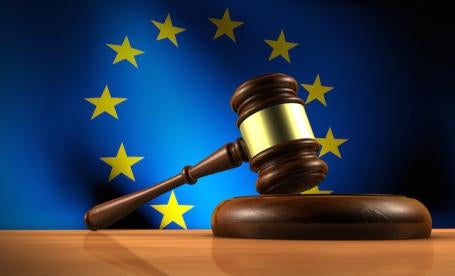A European Court of Justice (ECJ) advocate general, Yves Bot, has called for the European Union–U.S. Safe Harbor Agreement to be invalidated due to concerns over U.S. surveillance practices (press release here, opinion here). The ECJ has discretion to reject the recommendation, but such opinions are generally followed. A final decision on the issue is expected to be issued late this year or next year.
The issue arises out of the claims of an Austrian law student, Max Schrems, who challenged Facebook’s compliance with EU data privacy laws. (The case is Schrems v. (Irish) Data Protection Commissioner, ECJ C-362/14.) He claims that the Safe Harbor Framework fails to guarantee “adequate” protection of EU citizen data in light of the U.S. National Security Agency’s (NSA) surveillance activities. Although the Irish data protection authority rejected his claim, he appealed and the case was referred to the ECJ.
The European Data Protection Directive prohibits data of EU citizens from being transferred to third countries unless the privacy protections of the third countries are deemed adequate to protect EU citizens’ data. The U.S. and EU signed the Safe Harbor Framework in 2000, which permits companies self-certify to the U.S. Department of Commerce (DOC) annually that they abide by certain privacy principles when transferring data outside the EU. Companies must agree to provide clear data privacy and collection notices and offer opt-out mechanisms for EU consumers.
In 2013, former NSA contractor Edward Snowden began revealing large-scale interception and collection of data about U.S. and foreign citizens from companies and government sources around the globe. The revelations, which continue, have alarmed officials around the world, and already prompted the European Commission to urge more stringent oversight of data security mechanisms. The European Parliament voted in March 2014 to withdraw recognition from the Safe Harbor Framework. Apparently in response to the concern, the Federal Trade Commission (FTC) has taken action against over two dozen companies for failing to maintain Safe Harbor certifications while advertising compliance with the Framework, and in some cases claiming compliance without ever certifying in the first place. For more, see here (FTC urged to investigate companies), here (FTC settles with 13 companies in August 2015), and here (FTC settles with 14 companies in July 2014).
Advocate General Bot does not appear to have been mollified by the U.S. efforts, however. He determined that “the law and practice of the United States allow the large-scale collection of the personal data of citizens of the [EU,] which is transferred under the [S]afe [H]arbor scheme, without those citizens benefiting from effective judicial protection.” He concluded that this amounted to interference in violation of the right to privacy guaranteed under EU law, and that, notwithstanding the European Commission’s approval of the Safe Harbor Framework, EU member states have the authority to take measures to suspend data transfers between their countries and the U.S.
While the legal basis of that opinion may be questioned, and larger political realities regarding the ability to negotiate agreements between the EU and the U.S. are at play, if followed by the ECJ, this opinion would make it extremely difficult for companies to offer websites and services in the EU. This holds true even for many EU companies, including those that may have cloud infrastructures that store or process data in U.S. data centers. It could prompt a new round of negotiations by the U.S. and European Commission to address increased concerns in the EU about surveillance.
Congressional action already underway may help release some tension, with the House Judiciary Committee unanimously approving legislation that would give EU consumers a judicial right of action in the U.S. for violations of their privacy. This legislation was a key requirement of the EU in an agreement in principle that would allow the EU and U.S. to exchange data between law enforcement agencies during criminal and terrorism investigations.
Although the specific outcome of this case will not be known for months, the implications for many businesses are clear: confusion and continued change in the realms of privacy and data security, and uncertainty about the legal rules of the game. Increased fragmentation across the EU may result, with a concomitant need to keep abreast of varying requirements in more countries. Change and lack of harmonization is surely the new normal now.





 />i
/>i
